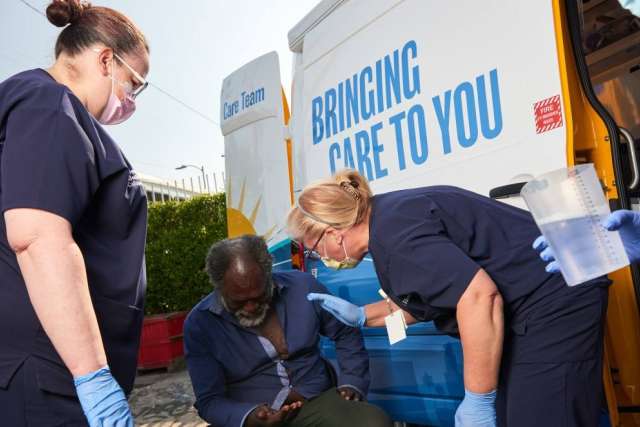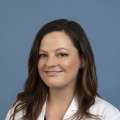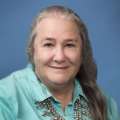Everett Scott is 62 years old and newly homeless. After being on the street for a month, he’s been staying at a shelter for men in Downtown Los Angeles.
His girlfriend and 11-year-old son are at a shelter nearby. Most days they get together for breakfast at Denny’s.
The past few months have been tough, Scott says. He spent several weeks in the hospital following a stroke and had a dispute with his landlord that landed his family on the street.
Adding complexity to an already difficult situation, Scott is a diabetic who uses insulin to manage his condition. He also has a heart condition. For more than two months he has been without his medications.
“Have any aches or pains? Would you like your blood pressure checked,” asks Natasha B. Wheaton, MD, an emergency department physician and associate program director for the UCLA Ronald Reagan/Olive View Emergency Medicine Residency Program.
Dr. Wheaton is one of 20 physicians taking turns to staff the UCLA Homeless Healthcare Collaborative (HHC), an in-community program to deliver equitable and high-quality preventive and urgent medical care, medical screenings and referrals to social services to people experiencing homelessness across Los Angeles.
Nancy Vega, RN, a registered nurse for the UCLA Homeless Healthcare Collaborative, checks Scott’s blood pressure and draws blood for a metabolic panel and A1C test, a simple blood test to measure average blood-sugar levels. She walks the sample to the HHC van, which is equipped with Wi-Fi and can provide basic screenings and diagnostics.
In the meantime, Dr. Wheaton tracks down Scott’s medication list from his primary care provider. When she reaches his doctor, she learns that Scott is on several medications and had a checkup prior to becoming homeless. She is relieved to hear that he is established with a primary care doctor and that the doctor’s office was able to refill and route his medications to the shelter.
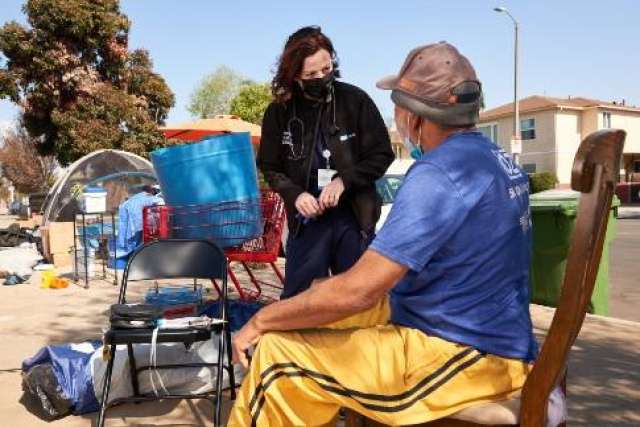
When Vega comes back, she reveals to Scott that his A1C is at a normal level — and his numbers actually have gone down from those reported by his primary care provider.
“Keep up whatever you’ve been doing,” she tells him, smiling beneath her mask.
With his medication refills back on track, the team considers this visit a small victory.
There are several barriers to care for people who are unhoused — social, structural, geographical, financial and more. Stigmatization and discrimination often lead to unfavorable encounters with health, social service, government and law-enforcement officials.
“While our vans are fully equipped with a pharmacy, with labs and so many different supplies, we're still in a van, and there's only so much we can do,” says Medell K. Briggs-Malonson, MD, MPH, MSHS, chief of Health Equity, Diversity & Inclusion at UCLA Health and executive sponsor of the HHC.
That, she says, “has been the greatest challenge — facing our limitations while still trying to make sure that all of our patients receive the medical, social and housing services that they need to thrive.”
What makes the work even more challenging are the nuances to caring for the unhoused population.
“Some of this population move around the city,” says Catherine M. Weaver, MD, the administrative medical director of the UCLA Homeless Healthcare Collaborative. “I’ve run into patients in Santa Monica who say their primary care is located in Glendale. How easy do you think it is for someone who already is lacking access to resources to get from Santa Monica to Glendale for an appointment at 3 pm on a Thursday?”
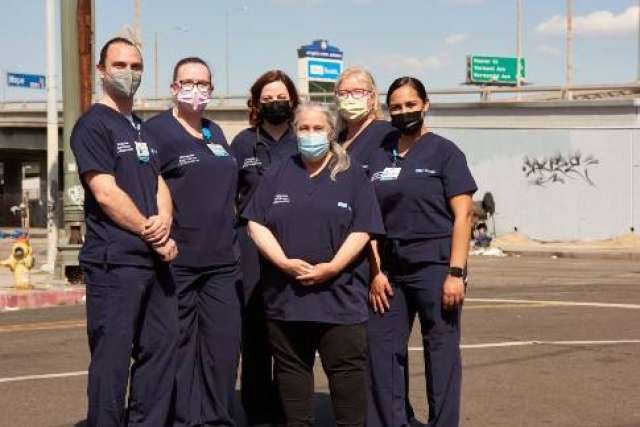
People who have a serious mental illness are 10-to-20 times more likely than the general U.S. population to experiencing homelessness.
Homeless people are more likely to have high rates of chronic disease, social isolation, increased morbidity and mortality, fragmented service use and poor primary care experiences.
“While some of our patients do have primary care doctors, often it’s a burden for them and, therefore, they don’t actually receive care,” says Dr. Briggs-Malonson. “The fact that we can come directly to them and treat them with respect and dignity, and really do our best to provide them with health care and education, makes all the difference.”
Since January, the UCLA Homeless Healthcare Collaborative has brought a spectrum of crucial health care services to unhoused people at no cost to them.
Combining a vision with data
It all began at the start of the COVID-19 pandemic, when UCLA Health Quality Management Services and the UCLA Health Office of Health Equity, Diversity, and Inclusion began analyzing data on past emergency room visits by patients experiencing homelessness. At the same time, an anonymous donor approached UCLA Health about funding a project to more concretely address care for people experiencing homelessness in the community.
“We combined the donor’s vision with our data and a multidisciplinary team to think about the health care and social needs for this population. The timing was perfect, and there was great synergy,” says Dr. Briggs-Malonson.
According to UCLA Health data, 85% of emergency department (ED) visits for people experiencing homelessness are due to primary- or urgent-care conditions that can be prevented or treated in the community. In addition, 15% of ED visits require specialty care or inpatient admission.
In August 2021, Brian P. Zunner-Keating, RN, MSN, was named director of the Homeless Healthcare Collaborative.
He says the team, which includes two executive sponsors (Dr. Briggs-Malonson and Janet Rimicci, RN, senior director for the Santa Monica-UCLA Medical Center at UCLA Health) and two medical directors (Mary Marfisee, MD, clinical programs director, and Dr. Weaver, administrative medical director), mobilized quickly.
“We envisioned a highly professionalized care-delivery model when we created the UCLA Health Homeless Healthcare Collaborative. It was important to us that the care that we provide on the street be the same high quality, compassionate care that we, as UCLA Health, provide in our brick-and-mortar clinics, emergency departments and hospitals,” Dr. Briggs-Malonson says.
Partnership is central to the collaborative’s mission. “We cannot do this alone,” Dr. Briggs-Malonson says.
“We respect the work that has been done by organizations working in this area for decades,” she continues. “We are not here to compete — we are joining them in this important work fighting the health care and social ills that plague those who are experiencing homelessness, filling in the gaps in primary and specialty care that others may not be able to provide and doing our best to connect our patients to housing resources.”
Learn more about the UCLA Homeless Healthcare Collaborative.
